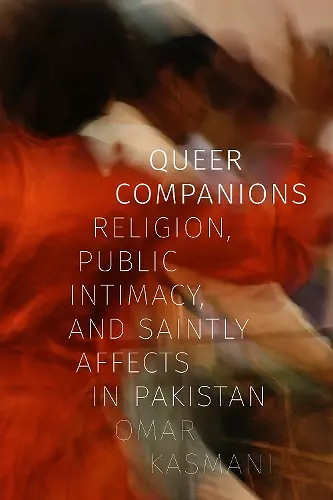Queer Companions
Religion, Public Intimacy, and Saintly Affects in Pakistan
Format:Paperback
Publisher:Duke University Press
Published:13th May '22
Should be back in stock very soon

In Queer Companions Omar Kasmani theorizes saintly intimacy and the construction of queer social relations at Pakistan’s most important site of Sufi pilgrimage. Conjoining queer theory and the anthropology of Islam, Kasmani outlines the felt and enfleshed ways in which saintly affections bind individuals, society, and the state in Pakistan through a public architecture of intimacy. Islamic saints become lovers and queer companions just as a religious universe is made valuable to critical and queer forms of thinking. Focusing on the lives of ascetics known as fakirs in Pakistan, Kasmani shows how the affective bonds with the place’s patron saint, a thirteenth-century antinomian mystic, foster unstraight modes of living in the present. In a national context where religious shrines are entangled in the state’s infrastructures of governance, coming close to saints further entails a drawing near to more-than-official histories and public forms of affect. Through various fakir life stories, Kasmani contends that this intimacy offers a form of queer world making with saints.
“A lyrical and moving meditation on Islamic saints, Sufi intimacies, and affective histories of contemporary Pakistan. Through encounters with fakir life stories, Omar Kasmani offers us an exquisitely written ethnography on the queerness of religion, region, and belonging. Queer Companions pulls us in, moving us toward more radical modes of the social life of the intimate.” - Anjali Arondekar, author of (For the Record: On Sexuality and the Colonial Archive in India) “Queer Companions presents the reader with perceptive observations that illustrate how desire not only works, but worlds. How striving for saintly companionship puts certain futures within your reach, while this orientation alienates you from other normative ways of life.” - Max Schnepf (Hypotheses) “By engaging with the ways in which fakirs in Sehwan encounter and experience affective bonds with the more-than-human and more-than-living, Kasmani ingeniously illustrates a form of queer world-making in unexpected places. For those who ruminate on questions pertaining to queerness, Islam, affective encounters with more-than-human entities, and/or religion-state relations, Queer Companions is an essential book and it will truly bloom as a companion in the time to come.” - Febi R. Ramadhan (Reading Religion) "In reading queerness religiously, this ethnography unsettles the epistemological foundations of both queer and religious studies, leaving the reader to contemplate unorthodox intimacies between saints and fakirs, religionists and queer scholars, shrines in the global South and gayborhoods in the global North." - Lucinda Ramberg (GLQ) "It is a testament to Kasmani’s engaging, poetic writing and thought-provoking theoretical intervention that I found myself mulling over the book for some time after reading it and continue to do so now months later. This is not a book to be read once. It warrants multiple (re)readings to fully tease out and appreciate the intricate suturing Kasmani performs of queer, religious, and affect studies to make an insightful, transformative argument for tarrying at the intersections of these disciplines to rethink their very constitution and possibilities." - Jessica Vantine Birkenholtz (Pacific Affairs) “Kasmani’s multilingualism, the length of his fieldwork research, and his personal cultural and religious backgrounds offer a unique perspective that is a valuable addition to the literature.” - Suvarna Variyar (Journal for the Academic Study of Religion) “An excellent read . . . [Queer Companions] will draw in students at all levels while introducing them to recent anthropological theorizing and method.” - Katherine Pratt Ewing (Journal of Anthropological Research) "Kasmani’s Queer Companions moves through a detailed web of relationships, networks, and bureaucracies to give us a rich and moving ethnography of fakir lives in Sindh, Pakistan." - Hafsa Arain (Anthropological Quarterly) "A tour de force in the anthropology of Pakistan, this book is certain to break new grounds in our understanding and engagement with the microcosm of South Asian Muslim devotional selfhood, in all its internal diversity."
- Vanja Hamzic (Bloomsbury Pakistan)
ISBN: 9781478018032
Dimensions: unknown
Weight: 340g
277 pages